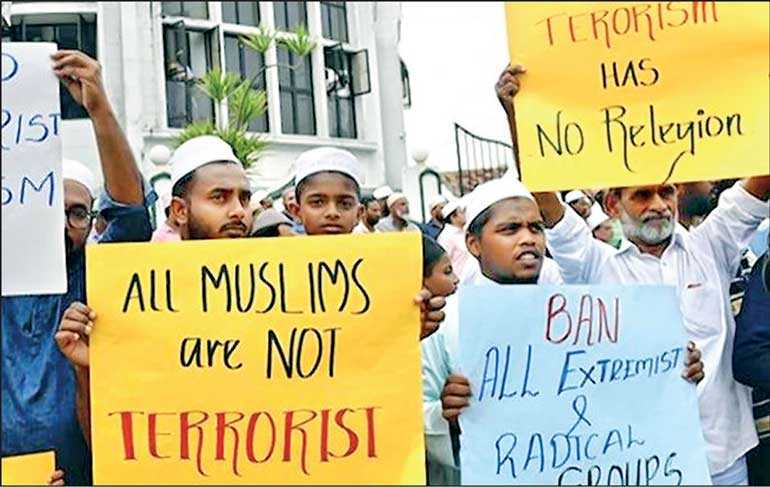Tuesday Feb 17, 2026
Tuesday Feb 17, 2026
Wednesday, 3 July 2019 00:00 - - {{hitsCtrl.values.hits}}

By Meera Srinivasan
The Hindu: Within a span of two weeks, an influential Buddhist monk in Sri Lanka and a local government authority came up with the same demand – that the people boycott Muslim traders and their businesses.
In the two months since the Easter terror attacks, concerns over security seem to have given way to discrimination, as can be seen in the recurring attempts by many to seek a boycott of Muslim businesses — both in the Sinhala-majority south and in the Tamil-majority north and east.
A Buddhist monk from the much-revered Asgiriya chapter went a step further last week, when he endorsed a violent call against Muslims. He subsequently backed down, saying his statement had been misinterpreted, but to most who heard his message, there was no doubt that it was provocative and unambiguously racist.
Samaraweera’s warning
Standing out amid the telling silence of Sri Lanka’s political class was Finance Minister Mangala Samaraweera’s statement asking “true Buddhists” to unite against the “Talibanisation” of the religion.
Days later, Colombo-based NGO Centre for Policy Alternatives wrote to the Police Chief about the Chief Prelate’s speech that “directly targets Muslim businesses and feeds into the environment of fear and hate that already exists against Muslim citizens in Sri Lanka.”
Seeking “urgent action” to investigate the monk’s statement, the letter reminded the authorities that “numerous citizens have already been questioned and for making far less dangerous statements”.
While it remains to be seen if the Police act on the letter, two other cases, where the Police had no hesitation in invoking the International Covenant on Civil and Political Rights (ICCPR) Act, point to a striking contrast. The Act says: “No person shall propagate war or advocate national, racial or religious hatred that constitutes incitement to discrimination, hostility or violence.”
Sinhala novelist Shakthika Sathkumara has been in prison for nearly three months now. His crime? Penning a story that touched upon about sexual abuse and paedophilia involving the Buddhist clergy.
In another case in May, Police arrested Abdul Raheem Masaheena, 47, under the ICCPR Act for wearing a dress with an image of a ship’s helm or steering wheel that the Police mistook for a Dharmachackra, considered to represent Buddha’s teachings and moral order.
The Act, which many had championed for its potential to promote and protect individual rights, is now haunting citizens, putting their civil liberties and fundamental freedoms at risk. Meanwhile, Sri Lanka’s Muslims continue to bear the brunt of the fallout of the Easter bombings.
Last week, a Pradeshiya Sabha (Local Government body) in Puttalam District, some 150 km north of Colombo, sought to ban at least 80 Muslim traders in the area from the pola, or the weekly community market.
The Mahinda Rajapaksa-backed Sri Lanka Podujana Party, which controls the local body, has distanced itself from the Chairman, who wrote to the Police seeking the ban. But there are no indications yet of the party initiating disciplinary action. In any case, Sri Lanka’s top political leadership has said little in the wake of the disturbing anti-Muslim rhetoric and actions.
However, the trend has drawn concern from many citizens and from international actors. On Wednesday, a delegation of envoys representing Organisation of Islamic Cooperation countries held two separate meetings with President Maithripala Sirisena and Prime Minister Ranil Wickremesinghe, according to a statement. Raising concern over the safety of the Muslim community in the island, they emphasised the need for Sri Lanka’s political leadership to “take proactive” measures to create a peaceful and harmonious atmosphere.
In her opening statement at the UN Human Rights Council session recently, High Commissioner for Human Rights Michelle Bachelet highlighted the developments in Sri Lanka and noted that the terrorist attacks have “fuelled increasing tensions”. “I am disturbed by reports of anti-Muslim attacks; recent statements by some religious leaders inciting violence constitute worrying early warning indicators that should be addressed,” she said.
Many Sri Lankans are hoping their leaders will do just that.